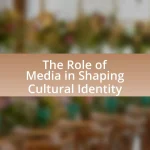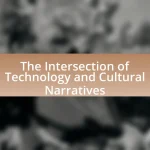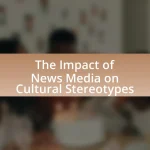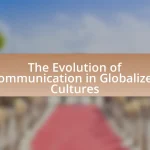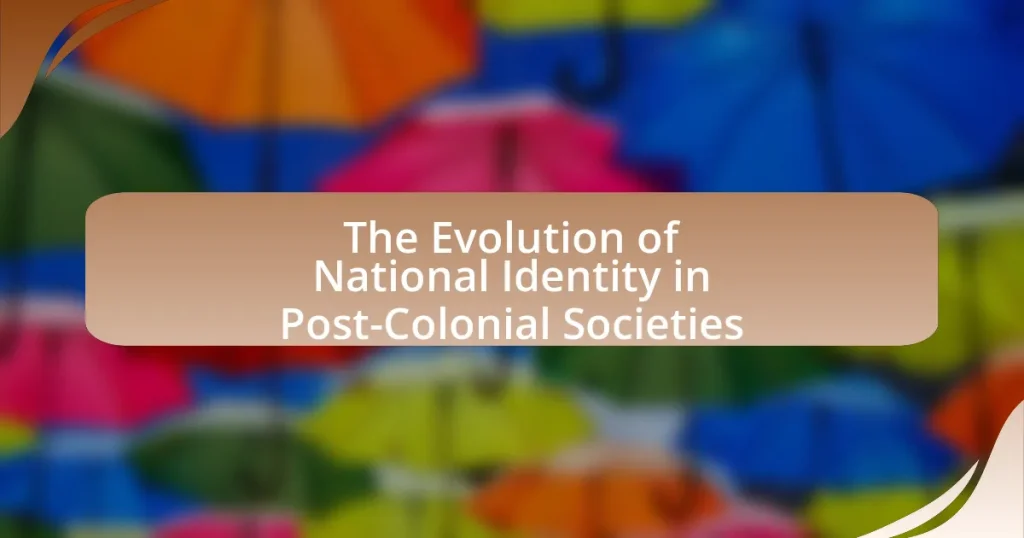The article examines the evolution of national identity in post-colonial societies, highlighting the transition from colonial rule to self-determined identities shaped by historical, cultural, and political factors. It discusses how nations like India and Nigeria have reclaimed indigenous cultures and languages, fostering unity amidst ethnic diversity and globalization. Key historical events, cultural factors, and the impact of colonial legacies are analyzed to illustrate how national identity influences social cohesion and political stability. The article also addresses the challenges of maintaining national identity in a globalized world and explores practical strategies for fostering a cohesive national identity through education and community initiatives.
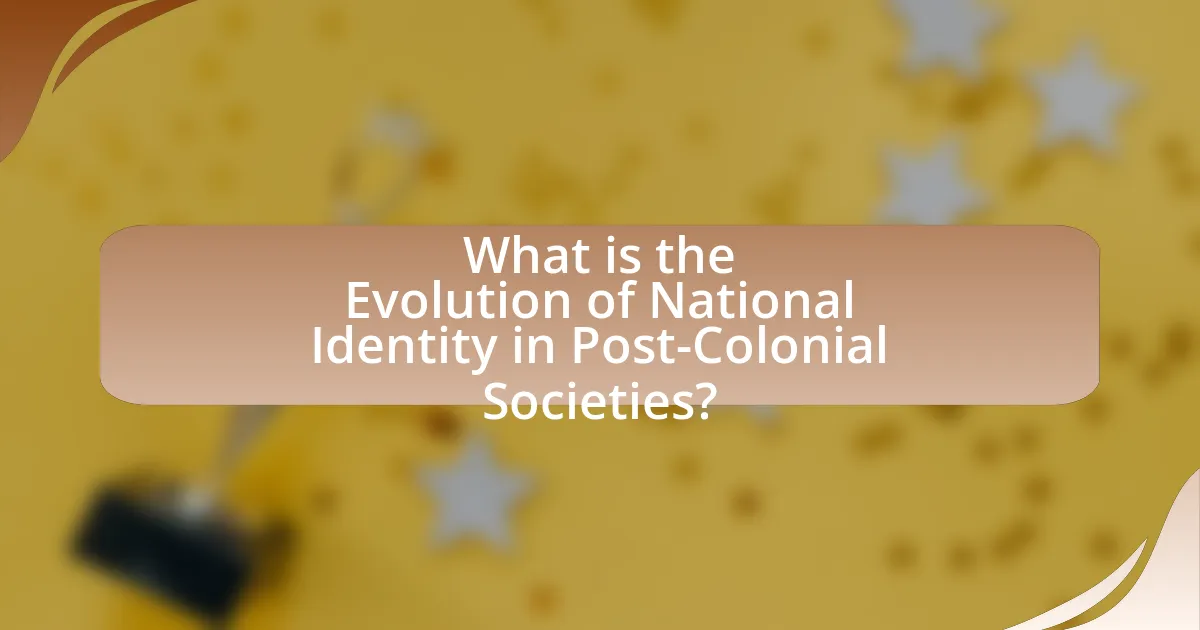
What is the Evolution of National Identity in Post-Colonial Societies?
The evolution of national identity in post-colonial societies involves the transition from colonial rule to self-determined identities shaped by historical, cultural, and political factors. Following independence, many nations grappled with the legacies of colonialism, which often included imposed identities that marginalized indigenous cultures. For instance, countries like India and Nigeria have seen a resurgence of local languages and traditions as integral components of national identity, reflecting a rejection of colonial narratives. Additionally, the process of nation-building has been influenced by factors such as ethnic diversity, economic challenges, and globalization, leading to complex and sometimes contested identities. The emergence of movements advocating for indigenous rights and cultural preservation further illustrates this evolution, as seen in the rise of indigenous political parties in countries like Bolivia. Overall, national identity in post-colonial societies is characterized by a dynamic interplay of historical context, cultural reclamation, and ongoing negotiations of identity in a globalized world.
How has national identity changed in post-colonial contexts?
National identity in post-colonial contexts has evolved significantly as nations seek to redefine themselves apart from colonial legacies. This transformation often involves a reclamation of indigenous cultures, languages, and histories that were suppressed during colonial rule. For instance, countries like India and Kenya have embraced their pre-colonial traditions and narratives to foster a sense of unity and pride among diverse ethnic groups. Additionally, the rise of nationalism in post-colonial states has led to the establishment of new political identities that prioritize self-determination and sovereignty, as seen in the movements for independence throughout Africa and Asia in the mid-20th century. These changes reflect a broader shift towards inclusivity and recognition of multiculturalism, as nations navigate the complexities of their colonial pasts while striving for a cohesive national identity.
What historical events have influenced national identity in these societies?
Historical events such as independence movements, colonial resistance, and civil rights struggles have significantly influenced national identity in post-colonial societies. For instance, the Indian independence movement, culminating in 1947, fostered a sense of unity and national pride among diverse ethnic groups, shaping India’s identity as a sovereign nation. Similarly, the anti-apartheid movement in South Africa, which led to the end of institutionalized racial segregation in the early 1990s, redefined national identity by promoting inclusivity and reconciliation among its citizens. These events serve as pivotal moments that not only marked the transition from colonial rule to self-governance but also instilled a collective consciousness and cultural identity that continues to evolve in these societies.
How do cultural factors shape national identity in post-colonial societies?
Cultural factors significantly shape national identity in post-colonial societies by influencing collective memory, language, traditions, and social norms. These elements serve as a foundation for individuals to connect with their heritage and establish a sense of belonging. For instance, the revival of indigenous languages and cultural practices in countries like India and Nigeria has fostered a renewed sense of identity that counters colonial narratives. Additionally, literature and art reflecting local experiences contribute to a shared national consciousness, as seen in the works of authors like Chinua Achebe and Arundhati Roy, who articulate the complexities of post-colonial identity. This cultural reclamation not only reinforces national pride but also promotes unity among diverse ethnic groups within these societies.
Why is understanding national identity important in post-colonial studies?
Understanding national identity is crucial in post-colonial studies because it shapes the collective consciousness and cultural narratives of formerly colonized societies. National identity influences how these societies reconstruct their histories, assert their sovereignty, and navigate global interactions post-independence. For instance, the emergence of national identity in countries like India and Nigeria has been pivotal in fostering unity and resistance against neocolonial influences, as seen in the works of scholars like Partha Chatterjee and Chimamanda Ngozi Adichie. Their analyses highlight how national identity serves as a framework for reclaiming cultural heritage and promoting social cohesion, thereby validating the importance of this concept in understanding the complexities of post-colonial contexts.
What role does national identity play in social cohesion?
National identity plays a crucial role in fostering social cohesion by providing a shared sense of belonging and purpose among individuals within a society. This collective identity helps to unify diverse groups, promoting mutual understanding and cooperation. For instance, in post-colonial societies, national identity often emerges as a response to historical injustices and cultural fragmentation, serving as a foundation for solidarity and collective action. Research indicates that strong national identity can lead to increased social trust and civic engagement, which are essential for maintaining social harmony and stability.
How does national identity affect political stability in post-colonial nations?
National identity significantly influences political stability in post-colonial nations by shaping citizens’ allegiance and sense of belonging. A strong national identity can foster unity and social cohesion, which are essential for maintaining political order. For instance, in countries like Ghana, a shared sense of identity post-independence contributed to a relatively stable political environment compared to nations where ethnic divisions undermined national unity, such as in Rwanda prior to the genocide. Furthermore, the lack of a cohesive national identity often leads to fragmentation and conflict, as seen in the Democratic Republic of the Congo, where diverse ethnic groups struggle for power and recognition. Thus, the relationship between national identity and political stability is critical, as it can either promote harmony or exacerbate tensions within post-colonial societies.
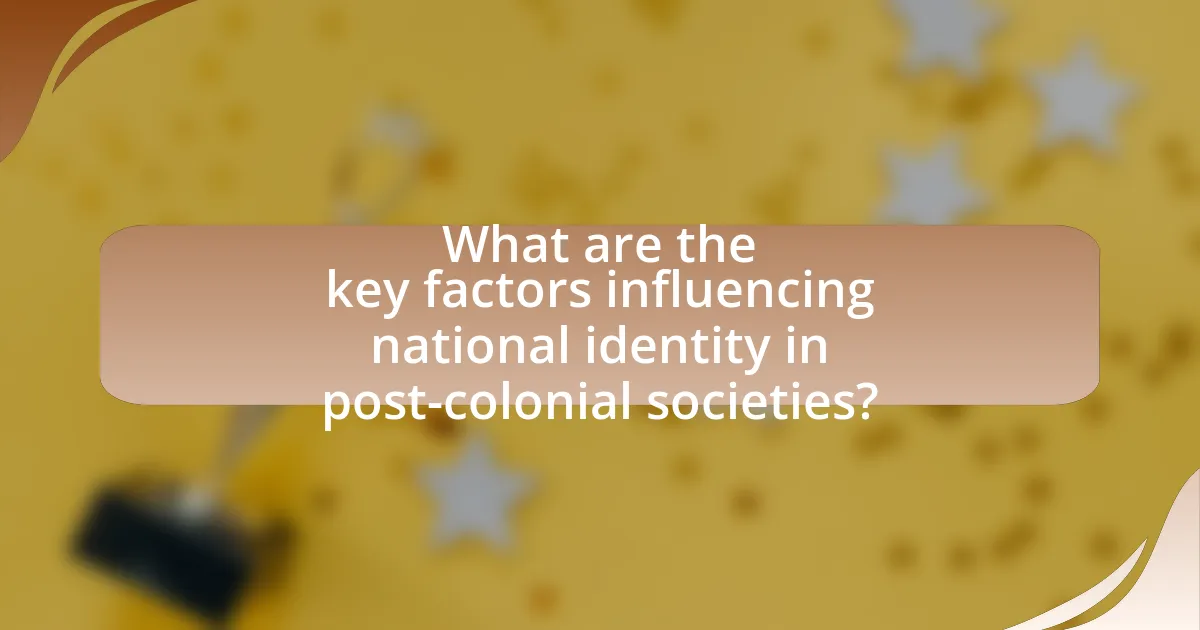
What are the key factors influencing national identity in post-colonial societies?
Key factors influencing national identity in post-colonial societies include historical context, cultural heritage, language, and political structures. Historical context shapes national identity through the legacy of colonialism, which often involves struggles for independence and self-determination. Cultural heritage, including traditions, customs, and art, plays a crucial role in fostering a sense of belonging and unity among diverse groups within a nation. Language serves as a vital marker of identity, influencing communication and cultural expression, while political structures, including governance and policies, can either promote inclusivity or exacerbate divisions among different ethnic or cultural groups. These factors collectively contribute to the ongoing evolution of national identity in post-colonial contexts.
How do colonial legacies impact contemporary national identity?
Colonial legacies significantly shape contemporary national identity by influencing cultural narratives, social structures, and political frameworks. For instance, many post-colonial nations retain colonial languages as official languages, which affects national cohesion and identity formation. Additionally, the imposition of colonial governance systems often leads to ongoing political instability and ethnic divisions, as seen in countries like Nigeria, where colonial borders disregarded ethnic boundaries, resulting in persistent conflict. Furthermore, colonial histories are often embedded in national education systems, shaping collective memory and identity, as evidenced by the varying interpretations of colonial history in countries like India and Kenya. These factors illustrate how colonial legacies continue to impact the identity and unity of contemporary nations.
What are the lasting effects of colonialism on cultural identity?
Colonialism has lasting effects on cultural identity, primarily through the imposition of foreign values, languages, and social structures that often undermine indigenous cultures. This disruption leads to a hybridization of identities, where local traditions may be altered or diminished, resulting in a complex interplay between colonial legacies and indigenous practices. For instance, in many African nations, colonial rule introduced European languages as official languages, which continues to affect communication and cultural expression today. Additionally, the erasure of traditional governance systems and the introduction of Western political frameworks have led to ongoing identity crises in post-colonial societies, as seen in countries like India and Nigeria, where the struggle between traditional and modern identities persists. These effects illustrate how colonialism has fundamentally reshaped cultural identities, creating challenges for self-definition and cultural continuity in formerly colonized nations.
How do historical narratives shape national identity in post-colonial contexts?
Historical narratives shape national identity in post-colonial contexts by providing a framework through which societies interpret their past and construct a collective memory. These narratives often emphasize themes of resistance, resilience, and cultural revival, which are crucial for fostering a sense of unity and belonging among citizens. For example, in India, the narrative of independence from British colonial rule has been instrumental in shaping a national identity that celebrates diversity while promoting a shared history of struggle. This is evidenced by the incorporation of independence leaders like Mahatma Gandhi into educational curricula and national commemorations, reinforcing a collective identity rooted in anti-colonial sentiment. Similarly, in African nations such as Kenya, the Mau Mau uprising is often highlighted in historical narratives to instill pride and a sense of national purpose, illustrating how these stories can galvanize citizens around a common identity.
What role does globalization play in shaping national identity?
Globalization significantly influences national identity by facilitating the exchange of cultural, economic, and political ideas across borders. This interconnectedness allows individuals to adopt and adapt elements from various cultures, which can lead to a hybridization of identities. For instance, in post-colonial societies, globalization has enabled the blending of local traditions with global cultural practices, resulting in new forms of national identity that reflect both indigenous heritage and global influences. Research by Arjun Appadurai in “Modernity at Large” highlights how global cultural flows impact local identities, demonstrating that globalization can both challenge and reinforce national identity by creating a dynamic interplay between global and local elements.
How does the influence of global culture affect local identities?
The influence of global culture significantly affects local identities by introducing new values, practices, and symbols that can reshape traditional cultural expressions. For instance, the proliferation of social media platforms allows global trends to permeate local communities, often leading to a hybridization of cultural practices where local customs are blended with global influences. Research by Arjun Appadurai in “Modernity at Large” highlights how globalization creates a “disjunctive” relationship between local identities and global cultural flows, resulting in both the erosion of traditional practices and the emergence of new, syncretic forms of identity. This dynamic illustrates that while local identities may adapt and incorporate global elements, they also resist and redefine these influences to maintain cultural uniqueness.
What are the challenges of maintaining national identity in a globalized world?
Maintaining national identity in a globalized world presents significant challenges, primarily due to cultural homogenization, economic interdependence, and migration. Cultural homogenization occurs as global media and consumer brands promote a dominant culture, often overshadowing local traditions and languages. For instance, the widespread influence of Western media has led to the erosion of indigenous cultures in various regions, as seen in the decline of native languages in countries like Canada and Australia. Economic interdependence complicates national identity as countries become reliant on global markets, which can dilute local customs and practices in favor of international standards. Additionally, migration introduces diverse cultures into national contexts, creating tensions between preserving a cohesive national identity and embracing multiculturalism. This dynamic is evident in countries like the United States, where the influx of immigrants has sparked debates over national identity and cultural integration.
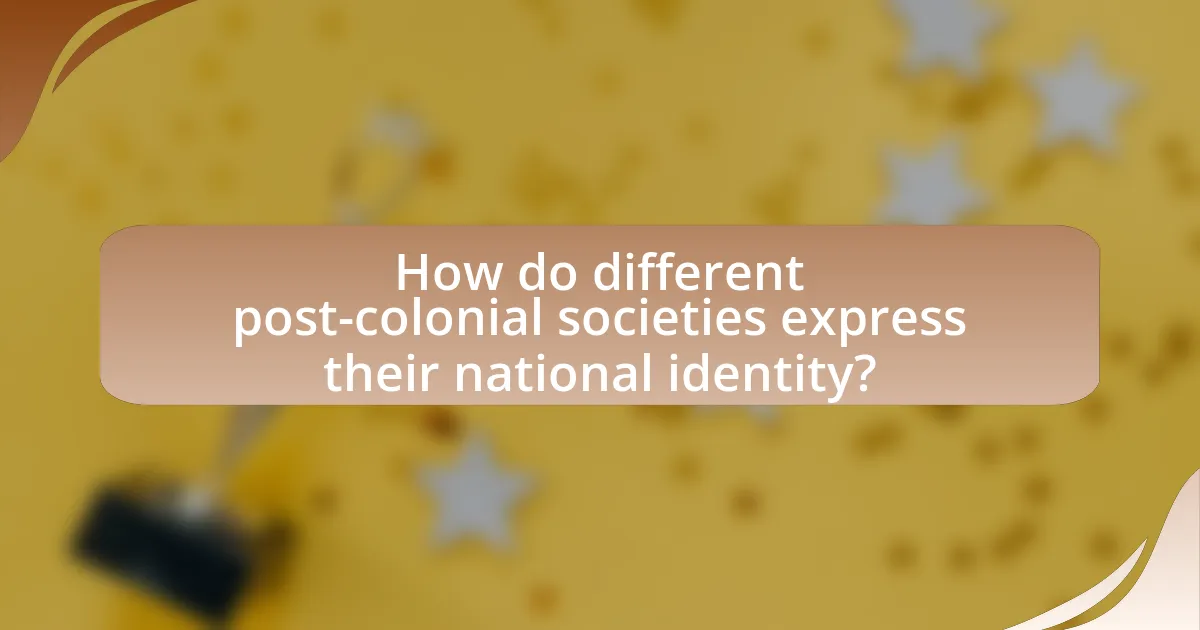
How do different post-colonial societies express their national identity?
Different post-colonial societies express their national identity through cultural revival, political movements, and the redefinition of historical narratives. For instance, in India, the promotion of indigenous languages and traditional art forms has been a significant aspect of national identity since independence in 1947, reflecting a departure from colonial influences. Similarly, in African nations like Ghana, the celebration of local customs and the use of symbols such as the Adinkra motifs in public spaces serve to reinforce a sense of unity and pride among citizens. These expressions are often rooted in the desire to reclaim cultural heritage and assert sovereignty, as seen in the emphasis on local governance and community-led initiatives in many post-colonial states.
What are the various forms of cultural expression related to national identity?
Cultural expressions related to national identity include language, music, dance, visual arts, literature, and traditional customs. Language serves as a primary vehicle for expressing national identity, as seen in countries like India, where numerous regional languages reflect diverse cultural identities. Music and dance, such as the traditional Maori haka in New Zealand, embody cultural heritage and collective memory. Visual arts, including indigenous crafts and contemporary art, often convey historical narratives and social issues tied to national identity. Literature, through works by authors like Chinua Achebe, explores themes of identity and belonging in post-colonial contexts. Traditional customs, such as festivals and rituals, reinforce community bonds and cultural continuity, exemplified by the Day of the Dead in Mexico, which celebrates cultural heritage and identity. These forms of cultural expression collectively shape and reflect the evolving nature of national identity in post-colonial societies.
How do literature and art reflect national identity in post-colonial societies?
Literature and art reflect national identity in post-colonial societies by serving as mediums through which cultural narratives, historical experiences, and social values are expressed and redefined. These forms of expression often challenge colonial legacies and assert indigenous perspectives, allowing communities to reclaim their identities. For instance, authors like Chinua Achebe and artists such as El Anatsui utilize their works to explore themes of cultural hybridity and resistance, illustrating the complexities of identity formation in the aftermath of colonial rule. This is evidenced by Achebe’s novel “Things Fall Apart,” which critiques colonial narratives and emphasizes pre-colonial African culture, thereby reinforcing a sense of national identity rooted in indigenous history and values.
What role does language play in the expression of national identity?
Language serves as a fundamental vehicle for expressing national identity by shaping cultural narratives and fostering a sense of belonging among individuals. In post-colonial societies, language often reflects historical experiences, cultural heritage, and collective memory, reinforcing a shared identity among citizens. For instance, the revival of indigenous languages in countries like New Zealand has been pivotal in affirming Māori identity and cultural pride, as evidenced by the increased use of Te Reo Māori in education and media. This linguistic resurgence not only preserves cultural traditions but also empowers communities to assert their identity in a globalized world.
How do political movements influence national identity?
Political movements significantly shape national identity by mobilizing collective sentiments and redefining cultural narratives. For instance, movements advocating for independence or civil rights often emphasize shared history, values, and aspirations, fostering a sense of unity among diverse groups. The anti-colonial movements in Africa during the mid-20th century exemplify this, as leaders like Kwame Nkrumah in Ghana promoted a vision of national identity rooted in self-determination and cultural pride, which helped unify various ethnic groups against colonial rule. Such movements can also challenge existing identities, leading to the emergence of new national narratives that reflect the aspirations of the populace, as seen in the post-apartheid era in South Africa, where the struggle against apartheid redefined national identity around themes of reconciliation and inclusivity.
What are the impacts of nationalism on national identity in post-colonial societies?
Nationalism significantly shapes national identity in post-colonial societies by fostering a sense of unity and cultural pride among diverse populations. This impact is evident as nationalism often emphasizes shared history, language, and traditions, which can help to forge a collective identity that counters colonial legacies. For instance, in India, the nationalist movement led by figures like Mahatma Gandhi promoted a unified Indian identity that transcended regional and religious differences, ultimately contributing to the country’s independence in 1947. Additionally, nationalism can also lead to the exclusion of minority groups, as seen in Rwanda, where ethnic nationalism contributed to tensions between Hutus and Tutsis, culminating in the genocide of 1994. Thus, while nationalism can enhance national identity by promoting solidarity and cultural heritage, it can also exacerbate divisions and conflict within post-colonial societies.
How do social movements contribute to the evolution of national identity?
Social movements significantly contribute to the evolution of national identity by challenging existing narratives and promoting new values that reflect the diverse experiences of a population. For instance, movements advocating for civil rights, gender equality, or indigenous rights reshape the collective understanding of what it means to belong to a nation. Historical examples include the Civil Rights Movement in the United States, which redefined national identity by emphasizing equality and justice, leading to legislative changes like the Civil Rights Act of 1964. Similarly, the anti-apartheid movement in South Africa transformed national identity by uniting various ethnic groups against oppression, culminating in the establishment of a democratic state that recognizes the rights of all citizens. These movements not only influence policy but also foster a sense of shared identity and purpose among diverse groups, thereby evolving the national identity to be more inclusive and representative of its populace.
What are the challenges faced in the evolution of national identity?
The challenges faced in the evolution of national identity include the impact of colonial legacies, ethnic diversity, and globalization. Colonial legacies often leave behind divisions and inequalities that complicate the formation of a cohesive national identity, as seen in countries like India, where historical divisions persist. Ethnic diversity can lead to tensions and conflicts, making it difficult to forge a unified identity; for instance, in Nigeria, multiple ethnic groups struggle for recognition and power, affecting national cohesion. Globalization introduces external influences that can dilute traditional identities, as seen in many post-colonial societies where Western cultural norms challenge local customs and values. These factors collectively hinder the development of a stable and inclusive national identity.
How do ethnic conflicts affect national identity in post-colonial societies?
Ethnic conflicts significantly undermine national identity in post-colonial societies by fostering divisions and promoting a sense of exclusion among different groups. These conflicts often arise from historical grievances and competition for resources, leading to a fragmented national identity that prioritizes ethnic affiliations over a unified national consciousness. For instance, in countries like Rwanda, the ethnic tensions between Hutus and Tutsis culminated in genocide, which not only devastated the population but also created lasting scars on the national identity, making it difficult for citizens to identify with a cohesive national narrative. Furthermore, the legacy of colonialism often exacerbates these divisions, as colonial powers frequently manipulated ethnic identities for control, leaving post-colonial states grappling with the consequences of these artificial divisions. This fragmentation can result in weakened state institutions and hindered social cohesion, ultimately affecting the overall stability and development of the nation.
What are the implications of identity crises in post-colonial nations?
Identity crises in post-colonial nations lead to social fragmentation, political instability, and cultural dislocation. These implications arise as individuals and communities struggle to reconcile their colonial past with their aspirations for a cohesive national identity. For instance, in countries like Nigeria, ethnic divisions have been exacerbated by colonial rule, resulting in ongoing conflicts and challenges to national unity. Additionally, identity crises can hinder economic development, as a lack of shared identity may impede collective action and governance. Historical evidence shows that nations grappling with identity issues often experience lower levels of social trust and increased violence, as seen in the Rwandan Genocide, which was fueled by deep-seated ethnic tensions rooted in colonial classifications.
What practical strategies can be employed to foster a cohesive national identity?
Practical strategies to foster a cohesive national identity include promoting inclusive education, encouraging cultural exchange, and implementing national dialogue initiatives. Inclusive education can help instill a shared sense of history and values among diverse populations, as seen in countries like Canada, where multicultural education has been integrated into the curriculum to reflect the nation’s diversity. Cultural exchange programs can enhance mutual understanding and appreciation among different ethnic groups, as evidenced by successful initiatives in South Africa that celebrate various cultural heritages. National dialogue initiatives, such as those employed in post-conflict societies like Rwanda, can facilitate discussions that bridge divides and promote unity, fostering a collective identity that transcends individual differences.
How can education promote understanding of national identity?
Education can promote understanding of national identity by integrating curricula that emphasize historical narratives, cultural heritage, and civic responsibilities. By teaching students about their nation’s history, including significant events and figures that shaped national identity, education fosters a sense of belonging and pride. For instance, studies show that inclusive education that reflects diverse perspectives can enhance students’ understanding of their national identity, as seen in post-colonial societies where multiple narratives coexist. This approach not only cultivates critical thinking but also encourages students to engage with their national identity in a meaningful way, ultimately leading to a more cohesive society.
What role do community initiatives play in strengthening national identity?
Community initiatives play a crucial role in strengthening national identity by fostering social cohesion and promoting shared values among diverse populations. These initiatives, such as local cultural festivals, community service projects, and educational programs, create platforms for individuals to engage with their heritage and each other, reinforcing a collective sense of belonging. For example, in post-colonial societies, community-driven efforts often highlight indigenous traditions and histories, which can counteract the effects of colonial narratives and promote a more inclusive national identity. Research indicates that such initiatives can lead to increased civic participation and a stronger commitment to national values, as seen in countries like South Africa, where community programs have successfully united various ethnic groups under a shared national identity post-apartheid.


